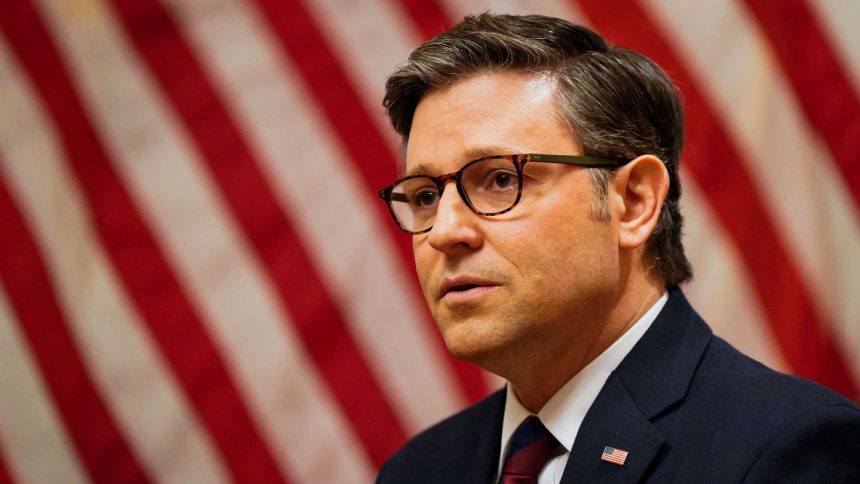House Speaker Mike Johnson showed up at court in Manhattan to support Donald Trump during the case that led to the former president’s conviction — a decision that he said he alone made one night at 10:15 p.m. during a fundraising trip to New York — but he stopped short of committing to some of Trump’s most vocal priorities during an appearance at the CNBC CEO Council Summit in Washington, D.C., on Tuesday: trade tariffs and mass deportations at the southern border.
When asked by CNBC’s Eamon Javers at the event if he would support Trump’s call for 10% across-the-board tariffs, Johnson would only say “I believe there’s a role to play for that, and I think we will have some very thoughtful discussion … vigorous debate about exactly when that can be applied and how it should be.”
Pressed on the tariffs, Johnson added, “Look, I don’t know that we know all the details of all the ideas yet, but I’m open to those discussions. But as the speaker of the House and the leader of my party in the Congress, I’m going to be very careful about what I commit to on the front end.”
Johnson is in lockstep with Trump over tax cuts and regulations, recently unveiling plans for an “aggressive” first 100 days of a new administration focused on cementing the 2017 Trump tax cuts and cutting regulations, among other sweeping priorities. “This new team in charge reflexively did almost exactly the opposite, and I think it’s not a mystery of how we get back to prosperity. We implement those same plans and principles again.”
“I still think of myself as a Reagan Republican. But I certainly have great respect for what President Trump did,” Johnson said during the CNBC appearance. “In the 2015-2016 election cycle, he emphasized new things, working families, and workers, and trade, and tariffs, new approaches to that, China threat that he foresaw. And the border, of course, he emphasized. And I think that those ideas and issues were important to bring into the mix, and he expanded the tent, frankly.”
But on immigration, another top issue for Trump, Johnson again pushed back against committing to policy.
“You have got to be careful. I have spoken with President Trump about the deportation necessity. I mean, I think that’s right. By our estimates, maybe as many as 16 million illegals have come across that open border since Joe Biden took office. But the reality is, deporting them all is not a simple thing. I’m not even sure you could locate many of them. I mean, that’s part of the problem,” he said.
Pressed on the costs and logistics required, which Javers said would be “enormous,” as well as the legal issues, Johnson agreed.
“So the theory in this is probably different than the actual application of it. And that’s what we will have to sift through,” he said.
“Look, I think this is doing untold damage to the country. It’s catastrophic what the open border has done to us. … But we’re going to be dealing with this for decades to come. And it is a nation-changing, nation-shifting kind of problem. And we will have to deal with it and develop responses as we go.”
House Speaker weighs in on Fed Chair Jay Powell
Johnson also weighed in on the Federal Reserve, refusing to say whether he would support the removal of Fed Chair Jerome Powell. But he added, “I have always had concerns about the Fed as an institution itself. It is manipulation of the markets at some level.”
While Johnson allowed that he understands the rational for the Fed and “what the idea behind it is,” he focused on the fact that “they have been wrong on many occasions and wrong in recent years.”
He recounted one visit from Chairman Powell to Capitol Hill which he said occurred in late 2019 or early 2020 when he was chair of the Republican Study Committee, the largest caucus of conservatives, and to him showed how Powell was out of step with Republicans. “We had all the fiscal hawks in the room. … And he gave a quick update on the economy and spoke for 10 or 15 minutes and never mentioned the federal debt. And all the hands went up for the Q&A. And I said: ‘Well, Mr. Chairman, I can anticipate what they’re about to ask you.’
“I don’t remember his exact quote, but Chairman Powell said something to the effect of: ‘Well, I think too much emphasis is placed on the federal debt. Wrong room to say that in. … I could see the steam coming out of the ears of my colleagues.”
“I think some mistakes have been made. I have some concerns about it. Should it be a completely independent body and immune from politics? Probably. But I think a lot of attention has to be paid to their activities and the jurisdiction they have and the broad influence they have on the markets.”
Johnson said the almost $35 trillion in debt is not a sustainable trajectory, and with mandatory spending at 72% of the federal budget, all the time spent arguing over discretionary spending and how to limit that, and how to limit the size and scope of the government, “has gotten very serious. Now we’re spending our grandchildren’s finances. And they’re not going to enjoy the same liberty and opportunity and security that we have known because it simply will not be affordable. So we have to do big things. And we have to do it in a bipartisan fashion.”
Johnson said his first six months as House Speaker have demonstrated the new dynamics in Congress and the need to navigate them differently. “It’s not lost on us that we’re probably beyond the days of having 35- and 40-seat majorities in Congress. Because of redistricting and gerrymandering, we’re probably going to have small majorities on one side or the other for the foreseeable future. So you will need very thoughtful, very responsible members of Congress to sit around a room and arm-wrestle over this to figure out what the real answers are.”
“Even though I’m, by some estimates, a hardcore conservative, I’m not mad at anybody who’s not, right?”
On the biggest issue of all, certifying a Biden reelection if the president wins in November, Johnson equivocated a bit in his response. “That’s the intention. I agree with the sentiment. I mean, we absolutely have to make sure that it will be a free and fair election. And I trust and hope and believe there will be, so yes. … If it’s a fair election, yes, of course.”
Read the full article here




